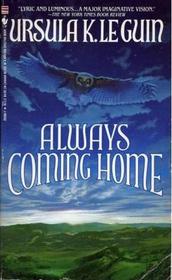Helpful Score: 4
One of my favorite books. I haven't read it in a while but may again.
Helpful Score: 4
I lover her books but this one was just to involved in creating a culture and didn't spend enough time telling a story.
Helpful Score: 4
Le Guin is an excellent fantasy author - this is a beautiful novel that includes song lyrics and poems as well.
Helpful Score: 1
This one is really difficult to rate, since it is utterly unique. It's not an easy read, and may require periods of time away from it in order to fully absorb the content.
LeGuin's treatise (?) outlines an imagined future civilization located in central California after The Big One (or several Big Ones). The landscape, climate, and culture of this far-future country is nearly unrecognizable, and LeGuin uses the notion of a "future archaeologist" (though the term is undoubtedly incorrect), setting down language, songs, stories, descriptions of rituals, technologies, and philosophies of a fully-imagined culture.
It is an immense work; one can scarcely begin to comprehend how she put it together or how she chose what to include and what to ignore. LeGuin's clearest message comes in the voice of "Pandora", when she says "This is a mere dream dreamed in a bad time, an Up Yours to the people who ride snowmobiles, make nuclear weapons, and run prison camps by a middle-aged housewife, a critique of civilisation possible only to the civilised, an affirmation pretending to be a rejection, a glass of milk for the soul ulcered by acid rain, a piece of pacifist jeanjacquerie, and a cannibal dance among the savages in the ungodly garden of the farthest West."
Whatever else it is, it stands alone. LeGuin -- so far as we know -- never set additional writings in the Valley of the Na. Unlike other science fiction / speculative fiction / fantasy writers, she appears to have not been bitten by the multi-novel saga. After devoting years to the development of a living, breathing, truly alien society, she simply walked away from it.
Whether that was a good thing will be found only in the mind of each reader. ANd that may have been her point all along.
LeGuin's treatise (?) outlines an imagined future civilization located in central California after The Big One (or several Big Ones). The landscape, climate, and culture of this far-future country is nearly unrecognizable, and LeGuin uses the notion of a "future archaeologist" (though the term is undoubtedly incorrect), setting down language, songs, stories, descriptions of rituals, technologies, and philosophies of a fully-imagined culture.
It is an immense work; one can scarcely begin to comprehend how she put it together or how she chose what to include and what to ignore. LeGuin's clearest message comes in the voice of "Pandora", when she says "This is a mere dream dreamed in a bad time, an Up Yours to the people who ride snowmobiles, make nuclear weapons, and run prison camps by a middle-aged housewife, a critique of civilisation possible only to the civilised, an affirmation pretending to be a rejection, a glass of milk for the soul ulcered by acid rain, a piece of pacifist jeanjacquerie, and a cannibal dance among the savages in the ungodly garden of the farthest West."
Whatever else it is, it stands alone. LeGuin -- so far as we know -- never set additional writings in the Valley of the Na. Unlike other science fiction / speculative fiction / fantasy writers, she appears to have not been bitten by the multi-novel saga. After devoting years to the development of a living, breathing, truly alien society, she simply walked away from it.
Whether that was a good thing will be found only in the mind of each reader. ANd that may have been her point all along.




